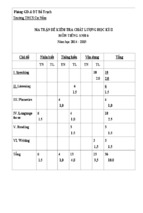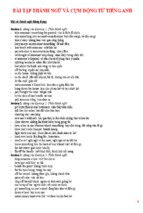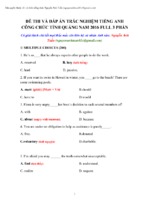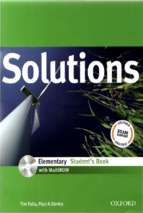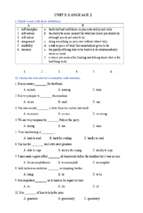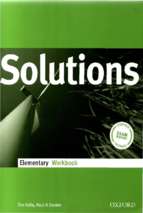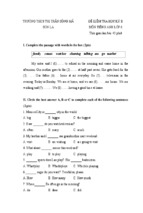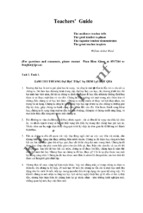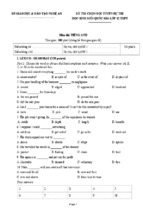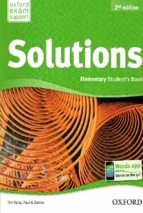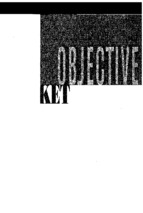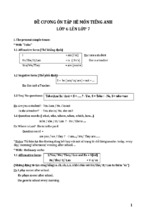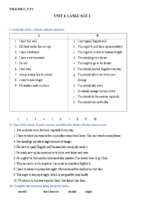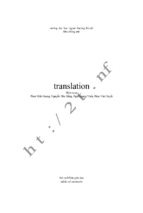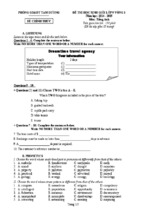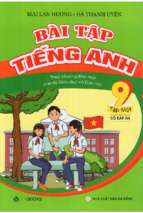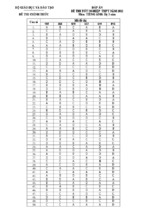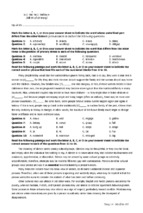Bachillerato General Unificado
ENGLISH - B1.1 - BGU
ENGLISH
Level
B1.1
STUDENT´S BOOK
FREE COPY
NOT FOR SALE
2
UNIT
3
• Newspaper Sections
• News Writing and Reporting
• School World
• Healthy Habits
• Earth Resources
• Character and Personality
• Feelings and Emotions
You will learn how to
• talk about news.
• announce a piece of news that
has happened recently.
• share life experiences.
You will learn how to
• speculate about lifestyles in
the past.
• express opinion and possibility
about past events.
• describe people, objects, and
events.
You will learn how to
• talk about people’s characters
and personalities.
• express feelings, attitudes, and
mood.
• describe events in the life of
famous people.
• Simple Present tense
• Simple Past tense
• Present Perfect tense
• Past Perfect tense
• Past modals
• Relative clauses
• Phrasal verbs
• Gerunds and infinitives
• Prefixes and suffixes
Grammar: using context clues to
make decisions about verb forms
according to the tenses
Reading: identifying the lead
paragraph of an article
Writing:
• using quotation marks to
report what other people say
or said
• writing the lead paragraph of a
short article, providing a clear
and concise overview of the
main points
Speaking: using idiomatic
expressions to share your own
experiences
Vocabulary: classifying
vocabulary into categories to
remember it better
Grammar: understanding the
structure of sentences that make
use of connectors
Reading: identifying the thesis
statement in an essay
Writing:
• using sequence connectors
such as first of all, second of all,
in summary, to organize the
ideas of a text
• writing a short essay
Listening: reading options
carefully before listening
to the audio to focus your
comprehension
Speaking: using expressions
such as Look! Well, I guess / I
know! / I think to engage in a
conversation
Vocabulary:
• paying attention to the prefixes
added at the beginning of a
word
• using grammar books,
dictionaries, or the Internet as
sources of reference
• transforming base words into
nouns by adding suffixes
Reading: looking at the
sentences that are immediately
before and after an idea to infer
missing information
Writing: writing a biography
following a specific structure
Listening: paying attention to
the speakers’ tone of voice to
interpret their feelings
Speaking: using an appropriate
tone of voice and gestures to
convey your feelings and emotions
when holding a conversation
A Newspaper Section
A Power Point Presentation
A Personal Blog
Project
Skills and Strategies
Grammar
CLIL
1
UNIT
Goals
UNIT
VP5Preliminares.indd 4
19/05/2016 02:35:20 p.m.
Project
Skills and Strategies
Grammar
Goals
CLIL
UNIT
VP5Preliminares.indd 5
4
UNIT
5
UNIT
6
• Old Traditions and Customs
• Remarkable People and Events
• Old Times and the Modern
World
• Landscapes
• Outdoor Activities
• Real Teen Problematic
Situations
• The Teenage Brain
You will learn how to
• talk about changes over time.
• share experiences and
accomplishments.
• discuss traditions.
You will learn how to
• check for information.
• ask for agreement.
• report what someone has said.
You will learn how to
• talk about what you will
normally do in real-life
situations.
• talk about what you would
generally do in unreal
situations.
• express regrets and wishes.
• Passive Voice
• Used to
• Tag questions
• Reported speech
• Compound adjectives
• First conditional
• Second conditional
• Third conditional
• Wish
Vocabulary:
• using visual aids to guess
meaning
• using context clues to find
missing words in a passage
• relating new language to
concepts already known to
memorize vocabulary
• using visual images and
relating them to language
clues to deduce the meaning
of new vocabulary
Reading: scanning the text to
identify specific information
Writing: writing a comparison
and contrast essay
Speaking: using That’s for sure
or No doubt about it to express
agreement
Vocabulary:
• relating new language to
concepts already known
• using language-based clues to
guess meaning
Reading:
• relating the content and the
conventions of a text to its
corresponding sub-headings
• identifying facts and opinions
Writing: using so and such to
place emphasis on descriptions
Listening: paying selective
attention and using general
world knowledge clues to
identify details
Speaking: using tag questions
to keep the conversation going
Vocabulary: associating
words in order to remember
expressions easily
Grammar: reasoning
deductively to apply rules to new
language situations
Reading: identifying and
differentiating between stated
and inferred information
Writing: writing arguments from
authority
Speaking: using say that again,
to ask for repetition
A Memory Tradition Survey
A Promotional Radio
Advertisement
A Debate
19/05/2016 02:35:21 p.m.
Review
1. Read the facts from the journalist notebook. Then, use Passive Voice to complete the news reports.
ones
cell ph
0
7
e
l
es sto
• t h ie v
y Mall
ed the
t h e C it
report
n
a
m
atch
• the w
70 cell phones
from
last week. The robbery
(a) by
(b) by the police soon after the
robbery
(e) by a
tropical storm next month. Storms
(f)
of strong winds and heavy rain. With the storms from
(g) and some roads
(h), but residents
by the WMO.
(c) by the mall’s manager.
The cell phones
According to the World Meteorological Organization
last year, homes
from the City Mall
the watchman early in the morning. The thieves
e
y
ced th
robber
denoun
r
e
g
a
an
a l l 's m
• the m
y
t h ie v e s
robber
d the
ie
if
t
n
e
a box
o l ic e id
n e s in
o
h
• the p
p
l
l
ce
nd the
an fou
-WMO, the Caribbean coast
were stolen
(i)
(d) in a box.
the
il l h it
w
m
r
to
pical s
• a tro
st
e
an coa
in m a k
Caribbe
eavy ra
h
d
n
a
g winds
• stron
maged
storms
year d a
t
s
a
l
s from
roads
• storm
troyed
s
e
d
d
ents
an
e r e s id
h
homes
t
d
e
form
M O in
• t h e W
2. Based on the news above, use the words to create questions in Passive Voice.
a. City Mall / stolen / What
?
b. identified / by / thieves / the police
?
c. found / the cell phones / where
?
d. a tropical storm / hit / the Caribbean Coast / by
?
e. made of / strong winds / heavy rain / the storm
?
f. homes / the tropical storm / damaged / last year / by
?
6
VP5ReviewUnit.indd 6
23/03/2016 07:55:53 a.m.
3. Circle the correct verb form to complete the conversation. Circle
both when either the gerund or the infinitive can be used.
Sam: That was a great performance, congratulations.
Lily: Thanks, I needed (to win / winning / both) this school contest to get a
scholarship.
Sam: Do you plan (a. to become / becoming / both) a professional musician
and continue (b. to play / playing / both) the violin when you finish
(c. to study / studying / both)?
Lily: Yes, I want (d. to play / playing / both) for the best orchestras in the
world.
Sam: Wow! Keep (e. to practice / practicing / both) and you’ll certainly be the
best.
Lily: I hope so. What about you? What would you like (f. to be / being / both)?
Sam: Well, I desire (g. to be / being / both) a famous tennis player. In fact, I’m
going (h. to train / training / both) with the best coach in the country,
Mr. Nadal.
Lily: Wow! When will you start (i. to train / training / both) with him?
Sam: Next week, I’m so excited!
4. Read and complete the text below. Use the given verbs in Simple Past or Past Perfect.
I
had seen
(see) Miss. Lee somewhere before, I
(a. know) it. She read
mystery books to me in first grade. Miss. Lee was my language teacher.
She wanted me to give her back a book she
(b. lend) me, but I
(c. not find) it. I was always late for school and generally the reading sessions
(d. already start) when I
(e. arrive). Before I
on the last day of class, I
(g. already lose) the book. I didn’t know what to tell her or
what to do. I never
(h. discover) what
(f. get ) to school
(i. happen)
to the book. It was a mystery!
5. Match the if clauses with the result clauses.
a. If someone sweeps over your feet,
b. If you walk under a ladder,
c. If you find a four-leaf clover,
d. If you have an itchy palm,
1. …it will bring you good luck.
2. …money will come your way.
3. …you’ll have bad luck.
4. …you’ll never get married.
7
VP5ReviewUnit.indd 7
23/03/2016 07:55:54 a.m.
6. Read and complete the text. Find the missing
words in the Word Bank.
Word Bank
• download
• hook up
• Internet
• put on
• send
• stay up
• technologies
• turn on
• turn off
• video
technologies
The world of information and communication
,
best known as ICTs, is definitely changing our lives. They can be valuable
instruments for education, business, and entertainment. These technological
tools include computers, the
(a), smartphones, radio and
television.
For example, people can do many different things with smartphones, which
are like small computers that keep you online. People can take pictures,
(b) and receive instant messages, surf the web, check their
email,
(c) apps, and even make
(d)
calls. Everybody wishes they had a smartphone at hand.
But, can people really control their online time? Most people today
(e) their computers in the morning and
all night. They
(f)
(g) their headphones and
all sorts of Internet resources. It is difficult for them to
(h) to the net to enjoy
( i ) the computer and take a
nice walk. It may be time to unplug the computer and enjoy the fresh air!
7. Complete the survey using the second conditional. Then, write your answers and
interview a partner.
What would you do if…
you
(a. be) a famous trend-setter?
you
(b. have) an extraordinary talent?
you
(c. be) a prince/princes?
a fairy
(d. grant) you a wish?
there
(e. be) a natural disaster?
you
(f. find) a piece of asteroid?
you
(g. find) a bag with $300,000 in it in a taxi?
you
(h. see) a thief stealing a cell phone?
yo
(i. buy) the latest smartphone?
you
(j. cannot) control your online time?
you
your
partner
8
VP5ReviewUnit.indd 8
23/03/2016 07:55:55 a.m.
1
Breaking News
UNIT
uu
General Objective
You will be able to talk about events that have
happened recently and share experiences of your school
community.
uu
Communication Goals
You will learn how to
• talk about news.
• announce a piece of news that
has happened recently.
• share life experiences.
uu
CLIL
• Newspaper Sections
• News Writing and Reporting
• School World
Vocabulary
• Sections of a Newspaper
• Words related to news writing and reporting
Grammar
• Simple Present and Simple Past tenses
• Present Perfect and Past Perfect tenses
uu
Idioms and Colloquial Expressions
• To hit the headlines
• That’s breaking news
• To cover the story
uu
Project
A Newspaper Section
You will create a newspaper section to narrate
recent news and key stories of your school
Discuss:
• Is there a newspaper at your school?
• What is the most famous newspaper
in your town and country?
U1_VP5 21 x 28.indd 9
5/19/16 2:42 PM
Lesson 1
Have You Read the News?
1. Match the columns to discover the headlines and the section they belong to.
a. Water bursts through river walls…
4
Sections
International
1. its doors to the public.
Social
b. Dollar against Euro…
2. hit the headlines once again.
Local News
c. Cheaper drug to treat…
3. the never ending battle.
d. New gallery has opened…
4. and floods local farmland.
e. Royal love scandal has…
5. heart disease has been successful.
Business
d Arts
Sports
Classifieds
Key Expressions
Hit the headlines: to become famous for being reported in the news
Health
2. Read and listen to the conversations about recent news. Then, complete the chart below.
Mary: �Wow, the royal couple has had
another love scandal!
Jane: That’s unbelievable!
Mary: �Believe it! It is published
everywhere. Haven’t you read
it yet?
Jane: �No, not yet. That´s shocking
news! And you know, the social
section never lies.
Juan: �Look! The new host country
for the Olympic Games has
already been chosen.
Mia: �Really? That’s the sports
event of the year! What’s the
fortunate country?
Juan: �It’s Brazil. This is the first time
for a Latin American country.
Mia: �Wow! That’s awesome!
Mark: �Do we have today’s broadsheet?
Anna: �Yes. I’ve already read it. Do you
want to check out the economic
issues?
Mark: �Well, I’m always interested in
the currency exchange rates.
Anna: �There’s a remarkable change.
This week the dollar has fallen
and the euro has risen.
Mark: Oh! That’s astonishing!
Claire: �Have you read the news today?
Peter: �No, I haven’t done it yet.
What happened?
Claire: ��Last Friday heavy rain led to
serious flooding in a small
town near our city
Peter: �Well, it isn’t hard to believe.
Sometimes things don’t work
as they should; besides, the
authorities haven’t fixed the
river walls since 1998!
Pronunciation
Rising intonation is used to
express strong feelings.
Listen and repeat
• Wow!
• That’s astonishing!
• That´s awesome!
• That´s shocking!
Newspaper Section
a.
Social
Topic
Ways to express feelings about news
That’s shocking news!
b.
c.
d.
10
U1_VP5 21 x 28.indd 10
4/19/16 11:49 AM
Grammar and Vocabulary
The Present Perfect Tense
Reflect on Grammar
Use it to talk about events that occurred at a non-specific time
in the past and continue to the present.
• I´ve already read it.
• The host country for the Olympic Games has been chosen.
• I haven’t read the local newspaper yet.
• Haven´t you read it yet?
The Simple Present Tense
• Use already to say that something happened
sooner than expected in affirmative
sentences.
• Use yet to mean “until now” in negative
sentences and questions.
Use frequency adverbs to indicate the frequency
of routines and habitual actions.
always sometimes never
Use it to express routines and facts.
• I’m always interested in the currency exchange rates.
• And you know, the social section never lies.
• Sometimes things don’t work as they should.
100%
50%
0%
3. Complete the sentences. Use the Word Bank in the Simple Present and the Present Perfect tenses.
Word
Bank
• win (2x)
• like
• send
• be
• attend
• arrive
• show
• close
• buy
• create
Monday January 30, 2013
Our basketball team has won the interschool championship
again. It is the third time our players
(a) the
trophy and succeeded in this important sports event.
The majority of the school´s families
awesome news! Students
(c) already
Grammar
Strategy
Use context clues
to make decisions
about the forms of
the verbs according
to the tenses.
The school science fair always
On this occasion, a 10th grade girl
learning English in a fun way.
It’s a fact that most students
(g)
new technologies and the computer lessons.
However, the school’s computers are very
old and don’t work properly. The school
(h) new ones yet.
(b) the Arts Festival this year. This is
(d) the families a thank you note.
(e) students’ creativity and love for design.
(f) some innovative software for
The school
(i) already
(j) its doors to new
students. Admissions for the next academic
year
(k) now over.
The school principal is still on vacation. She
(m) from Houston, Texas yet.
(l)
Project Stage 1
• Get into groups of three.
• Select your favorite section of a newspaper and justify your choice.
• Do some research about events, news and stories that have happened at your school.
11
U1_VP5 21 x 28.indd 11
3/30/16 8:35 AM
Lesson 2
From the Inside of a Newspaper
1. Look at the pictures and guess the roles of the people involved in newspaper production. Then,
listen and check.
Mr. Graham
Graphic Designer
Publisher
Claire Davis
Photographer
Columnist
Tom Middleton
Press Operator
Editor
Kim Harris
Journalist
Secretary
2. Listen and complete the interview with words in exercise 1.
Matt: �Good afternoon, Mr. Graham. I want to know about
the process of newspaper production. How did
you produce the last piece of news about the truck
accident?!
Mr. Graham: Well, we published it last week and we worked
as a team. The process involved different stages and
different staff. At 4:00 AM, the journalist went to
the scene where the event had taken place. (1) When
she arrived, the photographer had already taken
some pictures of the accident.
Matt: �What did the journalist do after she arrived on the
scene?
(a)
Mr. Graham: At 4:15, the
asked questions and recorded the
information. (2) Before the
interviews, she had checked her voice
recorder, of course! At 5:30, the
journalist wrote the news story.
Matt: �Did the journalist show her article to the
(b)?
Mr. Graham: Yes. (3) By the time the editor gave the
text to the
(c), he
had already checked the content of the story.
The graphic designer used the pictures that the
(d) had sent him one hour
before and selected those that best illustrated and
supported the article.
Matt: �What happened during the final stages of the
process?
Mr. Graham: Finally, the graphic designer created
the page layout and produced the final version
of the newspaper article. It was ready at 7:30.
(4) We published the news at 8:00 after the
(e) had printed it.
12
U1_VP5 21 x 28.indd 12
3/30/16 8:35 AM
Grammar and Vocabulary
3. Read the four numbered sentences in the interview and fill in the chart.
Sentence
First / earlier action
Second / later action
(1)
the photographer had already taken some pictures of the accident
the journalist arrived
(2)
(3)
(4)
The Past Perfect Tense
Reflect on Grammar
Use it to talk about an action that happened before another action in the past.
First) the photographer took some pictures of the
When the journalist arrived, the photographer had
accident. (Later) the journalist arrived.
already taken some pictures of the accident.
Common expressions: Before (that), By then, already
The Simple Past Tense
Use it to express actions that started and ended in the past.
How did you produce the last piece of news about
the truck accident?
We published it last week.
Common expressions: Last week, yesterday, that day,
when
4. Complete the interview with the verbs in parentheses. Use the Simple Past and the Past Perfect
tenses. Then, listen and check.
Journalist: Hi, Tina. You are a student at Lincoln High
School. Please tell me about the new library project or
the initiative you and your classmates had. What was
this story about?
noticed
Tina: OK. Last year my classmates and I
(notice) that our school library
(a. not have) many nice new books and we
(b. decide) to do something about
it. When we invited
(c. invite) neighbors
to donate books, we
(d. collect already) story books and textbooks from our
teachers. Before that, we
(e. talk) to the school principal to ask for his
permission, of course! The book collection process
(f. be) a great success. By the end of
last year, we
(g. gather already) 250 new books.
Project Stage 2
•
you have done research on.
•
E.g. journalist, editor, graphic designer...
a key role.
13
Lesson 3
Hit the Headlines
1. Match the concepts with their definitions.
a. Headline
1. The key or main information of an article
a
b. By-line
2. The title of an article
c. Lead paragraph
3. The body or secondary ideas of an article
d. Supporting details 4.
Line that gives the writer´s name
2. Read the headlines of the article below and predict the topic.
The article is about the Williams sisters’ life after ten years of practice.
The article is about the success of the Williams sisters over the last ten years.
3. Read the article and complete the diagram on page 15.
In professional women’s tennis around
the world there are two sisters who
have already made history since their
debut in 1994. They are Venus and
Serena Williams. They were born in the
United States, in the 80’s, and they live
in Florida with their family. The Williams
sisters have played in professional
tennis matches since the 1990’s and by
the year 2003 both had become No. 1 in
the world.
They have hit the headlines several
times and have made history for
various reasons. First, the Women’s
Tennis Association (WTA) has ranked
the Williams sisters World No. 1 in
singles on various occasions. Second,
they became the first black women
to accomplish this goal in the history
of tennis. Third, they have won more
Olympic gold medals than any other
female tennis player. “We play with our
hearts and souls for our country and
for all the women we represent in the
world,” said Venus.
But what makes the Williams sisters
such outstanding tennis players? “We
train really hard every day and keep
our bodies fit to build an aggressive
style,” said Serena. It is noticeable
that it takes discipline and great
physical effort on their part. “We also
eat very healthy food and if we get
an injury, we take good care of it until
recovery,” said Venus. But mental and
emotional aspects also play a key role.
“Sometimes, they can get nervous
when they get near the finish line in a
key set,” said Richard Williams, their
father, best friend and mentor. They
love each other and have strong family
bonds.
Writing Strategy
Reading Strategy
The lead paragraph of an article
is always the first lines of it.
• Use quotation marks “ ” to report what other people say or said.
• E.g. “We also eat very healthy food and if we get an injury, we take
good care of it until recovery,” said Venus.
14
U1_VP5 21 x 28.indd 14
5/23/16 4:28 PM
Reading and Writing
Who
What
Where
When
How / Why
Playing professional
tennis
Venus and Serena
Williams
4. Identify the secondary ideas in the article and complete the chart. Not all the spaces must be filled in.
Idea No.
Who
1
Women’s Tennis
Association
2
Venus and Serena
Williams
3
4
What
When
How /Why
First black women
to be ranked No 1
The Williams sisters
The Williams sisters
Where
Olympic Games
They play with...
Outstanding
players
5. Write a short article about the most recent event at your school.
(Headline)
(By-line)
Writing Strategy
Write the lead of a newspaper
article by providing a clear and
concise overview of the main
points: who, what, when, where,
how and why.
Lead
(Body )
Project Stage 3
• Use key questions to interview two members of the school community.
Record the interviews and take pictures, too.
• Write short narrations of the news you discovered.
• Create a nice design using the texts and the pictures.
15
U1_VP5 21 x 28.indd 15
3/30/16 8:35 AM
Lesson 4
Hot News
1. Listen to the conversations. Fill in the gaps with the expressions
in the Word Bank. Then, check the correct meaning
of the expressions
Joey: God! I completely forgot to go to the crime scene!
Julia: You mean the bank robbery?
Joey: Yes, it was raining and I had to finish another report.
Julia: Don’t worry. Mike and a photographer covered the story
Word Bank
• hit the headlines
• breaking news
• covered the story
.
Meaning: Mike and a photographer protected two cameras.
Mike and a photographer did the report.
Omar: Look! There was another tsunami close to the coast of Japan.
Patty: Wow! When did it happen?
Omar: Just half an hour ago! This is
Meaning:
Omar wants to cut the newspaper to get the news about Japan.
Omar is highlighting that the news is recent o has just happened.
Phil: Have you read the international news?
Clark: Yes! Sara has won the Latin American Music Award!
Phil: That’s awesome! She has
Meaning:
!
!
Sara has become famous because of her prize.
Sara has cut out music headlines from the newspaper.
2. Work with a partner. Use the previous expressions to share your own experiences.
I’ve just
noticed on TV
that the English
band Muse will visit
our country
in January.
Oh my God!
That’s breaking
news!
Speaking Strategy
Reflect on Values
Always Sometimes Never
Use idiomatic expressions to
share your own experiences.
¾¾ I read the newspaper to learn about
local and world events.
¾¾ I am curious about everyday happenings
and events.
16
¾¾ I talk about the news I read and express
my feelings about it.
U1_VP5 21 x 28.indd 16
Gap Activity
Student A goes to page 87.
Student B goes to page 89.
3/30/16 8:36 AM
Real Communication
Share Your Project
1. Discuss your experience.
a. What role(s) did you play in the school newspaper production? Describe the activities you completed.
b. How did you feel when performing those roles?
c. Did you experience any difficulties? Which ones?
d. Had you participated in a newspaper production before? What was the experience like?
e. What did you learn from this experience?
2. Read and answer the questions.
Newspapers can be published every day or every
week, thus, they can be daily or weekly newspapers. They
can also be local, national, or international. Newspapers
are typically printed on cheap, low-quality paper, usually
called newsprint. A newspaper is a publication that contains
informative articles, news of current events, advertising,
and a variety of entertaining features such as crosswords,
editorial cartoons, and comic strips.
Newspapers also cover a variety of topics and these are
organized in sections. Each section contains articles that are
based on facts. The title of an article, printed in large letters,
is called the headline, and the author and publishing date
are usually included. The different sections of a newspaper
include: politics, business and economy, education, opinion,
arts, sports, health and lifestyle, and a number of classifieds
about jobs, real estate, cars, and other products. Almost all
printed versions of newspapers also have online editions.
Broadsheet newspapers generally contain more serious
news than tabloids, which are smaller and emphasize
shocking stories about famous people. Newspapers’ readers
pay a subscription to help fund the newspaper production.
a. Which categories can newspapers be classified in?
b. What is newsprint?
c. What are the characteristics of a newspaper section?
d. What’s the difference between Broadsheets and
Tabloids?
Give your Presentation
• Introduce the members of your team.
• Mention the roles played by each one.
• Mention the section you have designed.
• Talk about the stories and the information you gathered
about the key, current events at your school.
• Talk about the people you interviewed and the sources
of your information.
Useful Expressions
• Good morning. This is our group. We are… (names)
• I played the role of…
• We have designed the
section.
• Our main stories/news are/is …This story is about…
• We have interviewed the school principal…
17
U1_VP5 21 x 28.indd 17
4/19/16 11:51 AM
Comic
The Interview
1. Listen and read.
At home...
At the ABC News headquarters...
Jim, take a look at this news.
It’s important for your job
interview tomorrow.
Well, I’m a good
communicator… and I love
to interact with people.
Mr. Sanders why
do you want to be
a news reporter?
OK, Mom!
e for
Tim ion:
Act the
n
Wheher Hits
t
Wea
Good! What’s
hitting the headlines
these days?
Hitting the headlines?
Oops! I guess… it’s the use of...
Have you read
the news lately?
What’s the
breaking news
about the weather?
I guess I have to learn
to hit the headlines and
break the news!
Well…
I don’t know.
18
U1_VP5 21 x 28.indd 18
3/30/16 8:36 AM
Quiz Time
1. Listen to the conversations between the editor (Tom) and the
newspaper staff. Complete the chart.
a. Claire
What do they have to do?
takes
all the pictures.
Job done?
Yes
b. Bill
all the interviews.
c. Sara
the complete article.
d. Susan
the pictures that support the article.
e. Carol
the advertisement.
f. Frank
the color pages.
2. Complete the dialog with the verbs in parentheses.
Use the Simple Present and the Present Perfect tenses.
Kim: Look at the social section of the news! It
(a. say) the Smiths got divorced.
Lars: This
(d. be) shocking news!
(e. read) the news about the
you
Kim: I know!
Garcia family?
Lars: That’s unbelievable! They always
(b. go) to parties together.
Lars: No, I
Kim: I know, and Mrs. Smith never
(c. eat) out without her husband.
Kim: They
W
3. Read the news story. Then, choose the correct option.
orld
(f. read) it. What has happened?
(g. celebrate) their 10th anniversary
Lars: Nice! That’s happy news!
Championship Final
a Rainy Match
Yesterday was the big day. The two soccer teams were ready
to play the World Championship final at Sun Stadium at 7:00
PM. By the time the players were ready to start the match, the
crowds had waited in line for hours. Many people attended
the game. When the news reporters arrived to cover the
event, the fans and hooligans had already taken pictures of
the football field and of the arrival of some players. The game
was amazing. The players did their best in spite of the terrible
weather conditions: before the game was over, it had started
raining…
a. The crowd waited in line before/after the match started.
b. The reporters arrived before/after the fans had taken
pictures.
c. It started raining before/after the game was over.
Self-Evaluation
Now I can...
Very Well
OK
A Little
¾¾ talk about a news item or an event that has happened recently..
¾¾ describe an event in the past and talk about an earlier moment.
19
U1_VP5 21 x 28.indd 19
4/19/16 11:54 AM
Glossary
A–E
astonishing: adj. very surprising. This
is astonishing news!
award: n. a reward someone gets
when he/she has achieved something.
(syn. prize)
awesome: adj. extremely good and
sometimes very impressive. (ant.
awful)
bond: n. in relationships, a reason
to love each other or feel they have
a connection to each other. Happy
families have strong bonds.
broadsheet: n. a newspaper that
publishes serious news. It is usually
printed on large sheets of paper.
burst: v. when the walls built round a
body of water break because water
levels have exceeded them.
columnist: n. a journalist who writes a
regular series of stories for a magazine
or newspaper and expresses his/
her opinions and comments about
recent news. Mr. Akerman is a famous
newspaper columnist.
currency: n. the type of money used in
a particular country or region. Japan’s
currency is the yen.
debut: n. the first time that a sports
person or performer appears in a
20
U1_VP5 21 x 28.indd 20
public or some remarkable event.
Shakira made her debut when she was
a little girl.
E–H
editor: n. the person who has overall
responsibility for the publication of
articles in a newspaper or magazine.
exchange rate: n. the value of the
money of one country in relation to the
value of the money of another country.
fact: n. a statement that people can
prove. (ant. opinion or comment)
People read the news to find out recent
facts.
flood: v. to be covered with water. A
pipe burst and the water flooded the
first floor of the house.
graphic designer: n. the person who
creatively designs the layout of a
newspaper page, book, leaflet, etc.
headline: n. the title of a news story. It
is usually large in size and catches the
reader’s attention.
headquarters: n. the place where a
company has its main offices. CNN has
its headquarters in Atlanta.
highlight: v. to emphasize something
so that people notice it and think about
it.
host: n. the place and people who
organize a special event. Brazil is the
host for the 2016 Olympic Games.
I–R
layout: n. the position of articles,
photographs,
graphics,
and
advertisements on a page.
lead: n. The beginning of the news
story. It tells the essentials of any
story: who, what, when, where, why,
and how.
match: n. game or contest in which
two or more people or teams compete
with each other.
mentor: n. an experienced person
who helps, supports, and motivates
someone who has less experience,
especially in their career. (syn. advisor,
tutor)
obituary: n. the newspaper section
which publishes someone’s death and
Activities on page 93
gives a short description of their life
and accomplishments.
outstanding: adj. extremely good or
impressive. (syn. superior, excellent;
ant. inferior, bad.)
record: v. to put images and/or sounds
onto a CD or DVD.
reporter: n. the person who researches
and writes newspaper articles. (syn. a
journalist)
S–Z
set: n. a series of games in tennis and
some other sports.
shocking: adj. when feeling extremely
surprised. (syn. outrageous; ant.
calming, comforting)
soft news: n. news that deals with
human interest stories which are not
that serious. (ant. hard news)
staff: n. the group of people who work
for a specific company or institution.
thank you note: n. a short piece
of writing to express gratitude to
someone. I sent a thank you note to
Fanny for dinner last week.
Colloquial Expressions
Breaking news: recent news that
is reported or revealed at the
moment.
Hit the headlines: to become
famous by being reported in the
news.
Cover the story: to report on an
event or recent happening.
4/19/16 12:09 PM
2
Healthy Life, Healthy World
UNIT
VP5 U2.indd 21
uu
General Objective
You will be able to talk about lifestyles and
speculate about habits and customs of the past.
uu
Communication Goals
You will learn how to
• speculate about lifestyles in the past.
• express opinion and possibility about past
events.
• describe people, objects, and events.
uu
CLIL
• Healthy Habits
• Earth Resources
Vocabulary
• Words related to healthy habits, earth resources,
and environmental degradation
Grammar
• Past Modals: must / could / might /
• Relative clauses: who / where / that
uu
Idioms and Colloquial Expressions
• To be fit as a fiddle
• To be in bad shape
• To be in murky waters
• To move heaven and earth
uu
Project
A PowerPoint Presentation
You will create a PowerPoint presentation about
lifestyles to share problematic situations you
identify in your community, as well as actions
people can take to protect the environment.
Discuss:
• Do you have a healthy lifestyle?
• Do you and your community take
care of our natural resources?
19/05/2016 02:50:42 p.m.
Lesson 1
Healthy Habits
1. Classify the actions in the Word Bank into healthy or unhealthy habits.
Vocabulary Strategy
Classify vocabulary into
categories to remember it better.
HEALTHY HABITS
UNHEALTHY HABITS
Eating fatty foods
Word Bank
• Eating fatty foods
• Smoking
• Drinking water
• Sleeping well
• Being sedentary
2. Read and listen to the conversation.
the correct options
Then, check
in the box below.
Jason:
Alan:
Jason:
Alan:
Jason:
Alan:
Jason:
Alan:
Jason:
Alan:
Jason:
Alan:
Jason:
Alan:
Jason:
Alan:
Useful Expressions
• Use I know! to show agreement with what someone says.
• Use I guess to express your opinion about something you are
not sure about.
Hi, Alan. I’m glad you came to my Granny’s Birthday party.
Thanks for the invitation. Is she really going to be 100 years old?
Yes, and look at her! She‘s not sedentary, instead she is very active!
I know! She has lots of energy. She must have slept all day long!
Well, she didn’t. It could have been because she took a 30 minutes nap this afternoon. But she
sleeps very well at night.
And, she is thin and fit. She must have eaten low-fat foods all of her life!
Yes. Her diet has always included steamed fish, grilled meat, and olive oil.
Wow! She has had a very healthy diet. She might never have eaten fatty food, I guess.
Well, she doesn’t like junk food. She prefers lots of veggies and fruit.
What about drinks? Does she drink sodas and coffee?
Not really. She prefers to drink water and fruit-flavored yogurt or fresh juice.
I guess she might never have smoked, right?
You’re right. She hates smoking and she has never been drunk. Besides, she loves exercising.
She walks the dog every day!
And she looks quite relaxed! Has she ever felt stressed?
Well, as you can see, she is always in a good mood and nothing makes her feel angry.
Gee! Now I see... Having such a healthy lifestyle must have prevented her from getting
lots of diseases.
fact
Key Expressions
Gee!: Wow!
22
VP5 U2.indd 22
a.
b.
c.
d.
e.
f.
• Getting drunk
• Being active
• Having a healthy diet
• Doing exercise
• Feeling stressed
opinion
Jason’s granny must have slept all day long.
She just took a 30-minutes nap this afternoon.
She might never have eaten fatty food, I guess.
She prefers to drink water and fruit-flavored yogurt or juice.
I guess she might never have smoked.
She is always in a good mood.
23/03/2016 08:20:20 a.m.
- Xem thêm -

